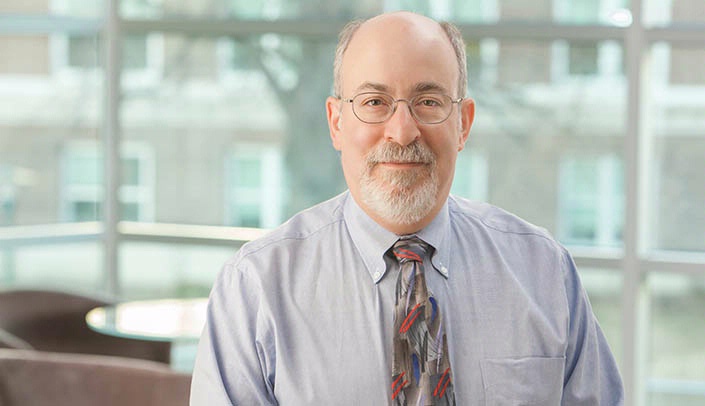When Bruce Gordon, M.D., first was approached about joining the Institutional Review Board, he demurred.
“I don’t have time,” he told Ernie Prentice, Ph.D., director of the IRB.
“We’ll put you down for three years,” Dr. Prentice said.
“Well, maybe one year,” Dr. Gordon allowed.
“Great, three years,” Dr. Prentice responded.
Twenty-five years later, Dr. Gordon is the new assistant vice chancellor for regulatory affairs and the executive chair of the IRB. Working with Dr. Prentice for a quarter century on issues of research ethics, he found not just a career path but a calling.
What others are saying
“I have worked closely with Dr Gordon for nearly two decades. He has a well-deserved national reputation in human subjects protections, born out of his tremendous work in Nebraska. We are fortunate to have Bruce take on expanded responsibilities as we continue to grow our clinical research initiatives.”
-Chris Kratochvil, M.D., associate vice chancellor for clinical research
“It really is fascinating,” Dr. Gordon said. “It is great for someone who likes to think about ethics, and rights and justice, and someone who uses debate and discourse as a route to better understanding. And I was raised that way — my family upbringing is arguing around the table, constantly questioning things — and IRBs are particularly well-known for arguing, and for questioning.
“But I’ve been particularly enamored of the ethical aspects related to the involvement of human beings in research — the idea of protecting human subjects, and of facilitating the conduct of ethical research involving human subjects.”
Dr. Gordon, who will oversee key components of the human research protection program at UNMC, UNO and at Children’s Hospital & Medical Center, is taking over at a challenging time. In January 2017, the federal government issued sweeping revisions to the Common Rule, the 35-year-old regulations that governed human-subject research.
“The agencies were very receptive to advice from the field,” Dr. Gordon said. “There are some big changes in there — changes which will reduce regulatory burden, changes which will improve the protection of human subjects, but changes that are going to require some dramatic modifications in the way we practice and the things we do.
“So that’s an incredible challenge,” he said. “There are a lot of nuances that we’re going to have to figure out — but some of these are really good modifications that have been long overdue.”
He is buoyed by the staff at the IRB, and he credits Dr. Prentice with creating a strong culture of attention to detail and attention to the big ethical picture surrounding the review of human-subject research. He also points out that he has been working in a leadership role at the IRB for many years.
“I’m not really coming into a new situation,” he said. “And I’m dealing with a group of really smart, really dedicated individuals, and that’s Ernie’s doing. He set up the office to function well, so I can step in very easily.
“Yes, there will be some course changes to reflect the new rule and to better support our stakeholders, but fundamentally, the core processes are intact and work well.”

Congratulations Bruce!
Know Bruce will do a great job! He's a class act!
Congratulations Bruce.
Kudos! Bruce brings not only comprehensive knowledge but also a sardonic wit to the IRB. It makes the hours go quickly.
Congratulations! I am a voice from the past. Worked with Dr. Al-Rashid in the 70's.
Congratulations Bruce. It should also be remembered that Dr. Gordon was the founding chairperson of the NCI Pediatric Central IRB. His pioneering work has lead to all NCI cancer clinical trials for both children and adults (several years later and patterned after the Pediatric initiative) now being centrally reviewed by national panels of oncology clinical trial physicians and statisticians. This had led to expert comprehensive reviews and lessened the work for local IRBs. A major milestone.